
Star Wars
Between a winter-blue night and a blistering dawn, a lone visor gleams—battered armor catching the light of a split sky. Planets turn like coins in a gambler’s palm while dark, angular silhouettes carve the cold and bright, darting wings burn the warm horizon. The vacuum hums with old grievances, and every scuff on that cuirass whispers the names of lost systems.
He walks the seam where light and shadow trade secrets, a courier of debts older than his own name. The sigil on his pauldron is chipped thin as memory; the weapon at his back is less a promise than a prayer. Rumors cling to him like frost: of a relic that could tilt the balance, of a child of starlight hidden behind mirrored steel, of credits stacked higher than conscience.
When the planet turns, the battle will follow; when he chooses, the galaxy will answer. In the hush before engines ignite, there is a heartbeat of possibility—small, stubborn, indestructible. Out here, wars are etched in the margins between the stars, and tonight the first line is being drawn.
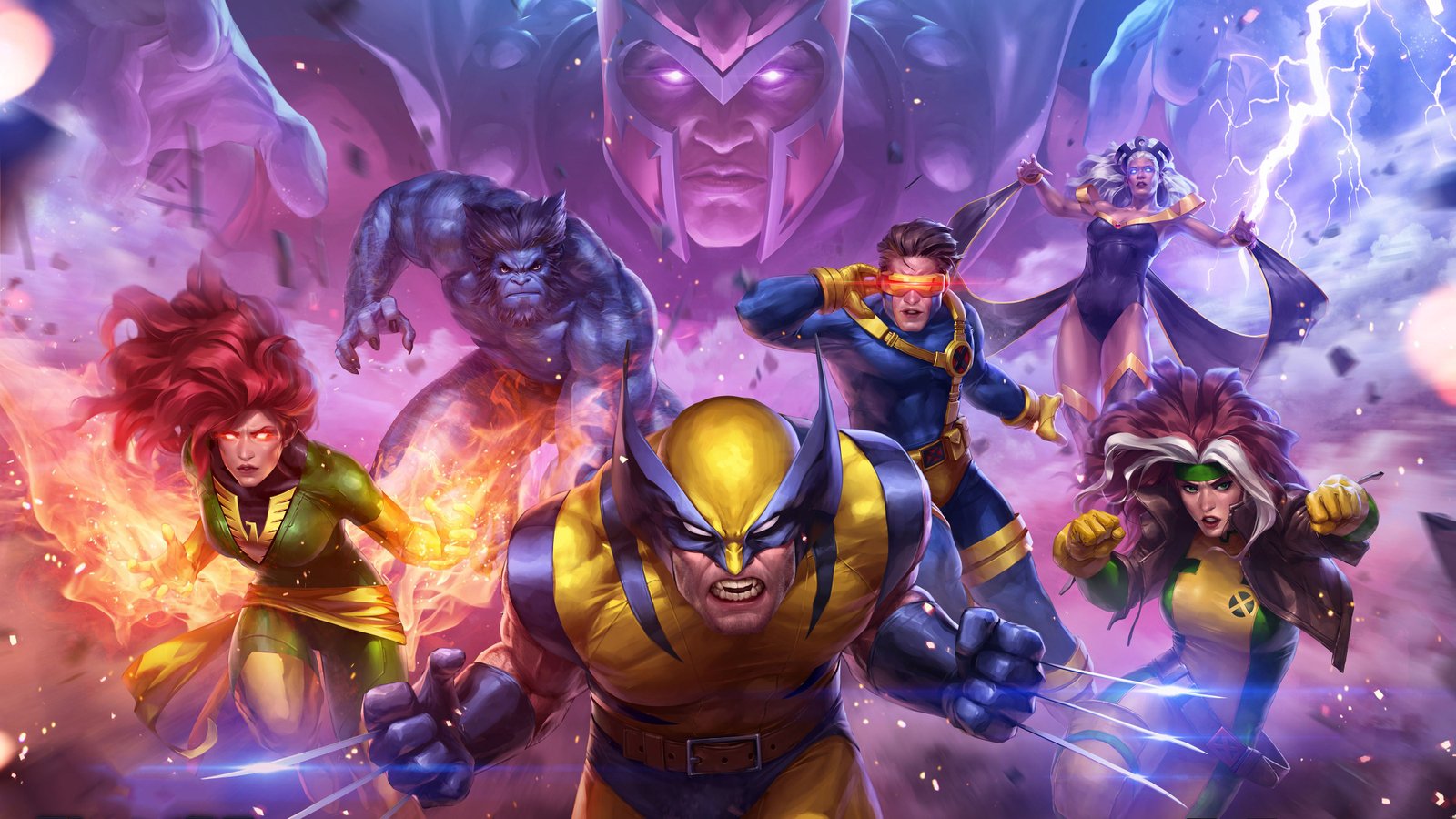
"Take this exit, here here!" said Milla with excitement as her and Yaven were driving down the highway. Yaven took the exit, and Milla continued to guide him...
Not too long after that, they pulled into the driveway of Xavier's mansion. "This is it Yaven! I told you!" said Milla...
Milla and Yaven were 19 and 20 years old. Milla learned about Yaven from the news. She heard it say that the "Mutant Problem" was getting worse, Yaven was being treated like an animal. Milla snuck him out of a hospital where doctors were trying to better understand his genetics. Yaven didn't believe there was a play for mutants, but Milla knew where it was, and how to get there... and so here they are!
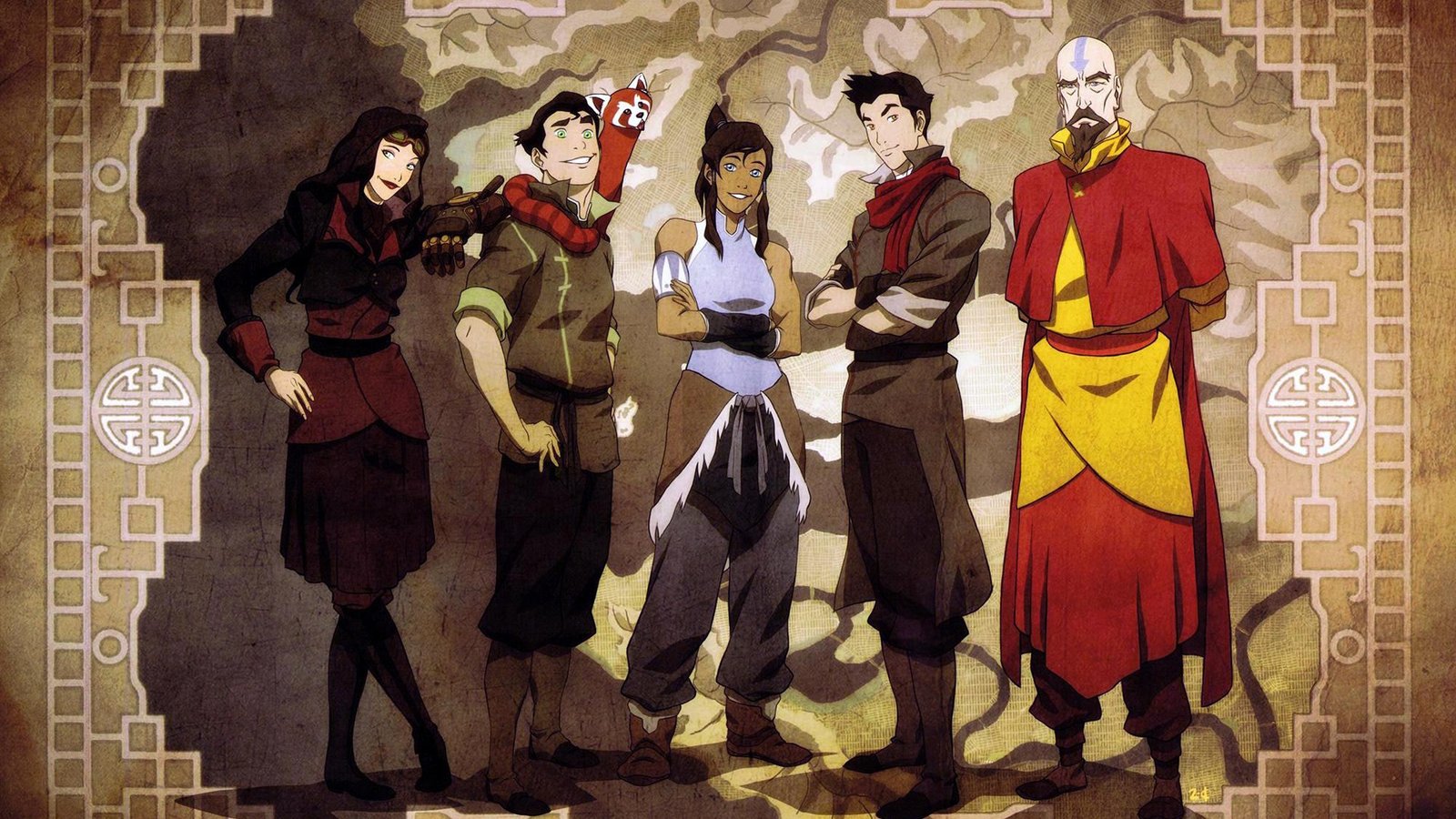
Blood between worlds
On a tea-stained wall of the city, a mural watches: five figures caught between legend and smoke—a sharp-eyed engineer in lacquered leathers, two brothers in red and green, a woman with storm-blue eyes and winter at her boots, and a patient monk draped in sunset robes. A red-furred shadow peers from a shoulder. Behind them, a tree unfurls its roots into stone and its branches into cloud, as if deciding which world to claim. Citizens pass, believing the paint has dried. They do not see the door.
The door thins when machines purr and prayers hush, when the tide forgets which moon to follow. Blood calls it open—the blood of lineages that remember fires older than factories, the blood of oaths braided tighter than any scarf. A whisper travels from spirit wind to steel avenue: bridges are breaking, and what crosses will not ask permission. Balance, once cupped in gentle hands, must be gripped again.
They will gather beneath the painted tree, five shadows stepping out of their own outlines, summoned by the rumor that the worlds have begun to trade prices. Some debts can be paid in coin, some in breath, but this one demands kinship—blood not as violence, but as belonging—and asks whom they claim when the sky is split. Before the first tear opens, before the first name is forgotten, they take one more still moment and breathe. It is the last quiet the worlds will share.
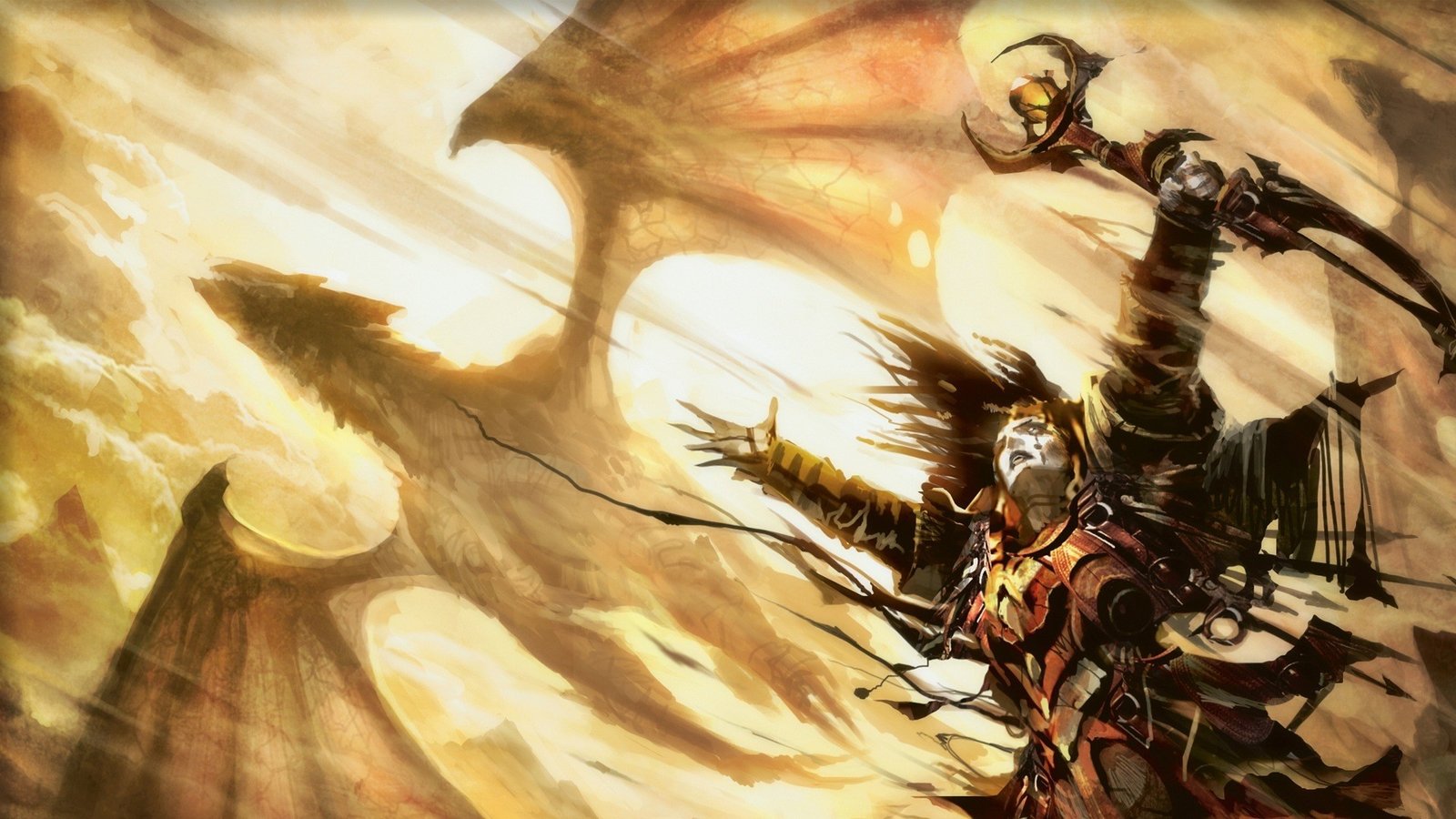
Legend of the Dragoon
The day the sky fractured into rivers of gold, the world remembered a word it had tried to forget: Dragoon. Shadows of a vast wing stitched themselves across the sun, and the wind carried a voice older than mountains through the high columns of stone. Stories once whispered in ember-light woke, ash flurrying like startled birds, and all the horizons leaned closer to listen. In that listening, something ancient turned its gaze upon the living.
On a ledge scoured by heat and history, a lone figure lifted a crescent staff that cradled a captive star. Armor shaped by talon and oath caught the blaze, feathered plates unfurling like the memory of flight, while the air around them went tight as a drawn bow. Above, a dragon’s silhouette carved a cathedral in the light, each beat of its wings tolling a forgotten bell. The covenant that bound storm to scale and flesh to flame shivered, seeking a voice brave enough to speak it again.
Kingdoms far below would call this omen wrath or salvation, but the sky knew it as a beginning. “Rise with me,” the figure breathed—not command, but pact—and the horizon answered with thunder veined in gold. Between shadow and sun, names long buried slid loose from the stone, and the chain of years cinched taut. When the winged titan descended, the world drew a single, sharp breath—and the legend opened its eyes.
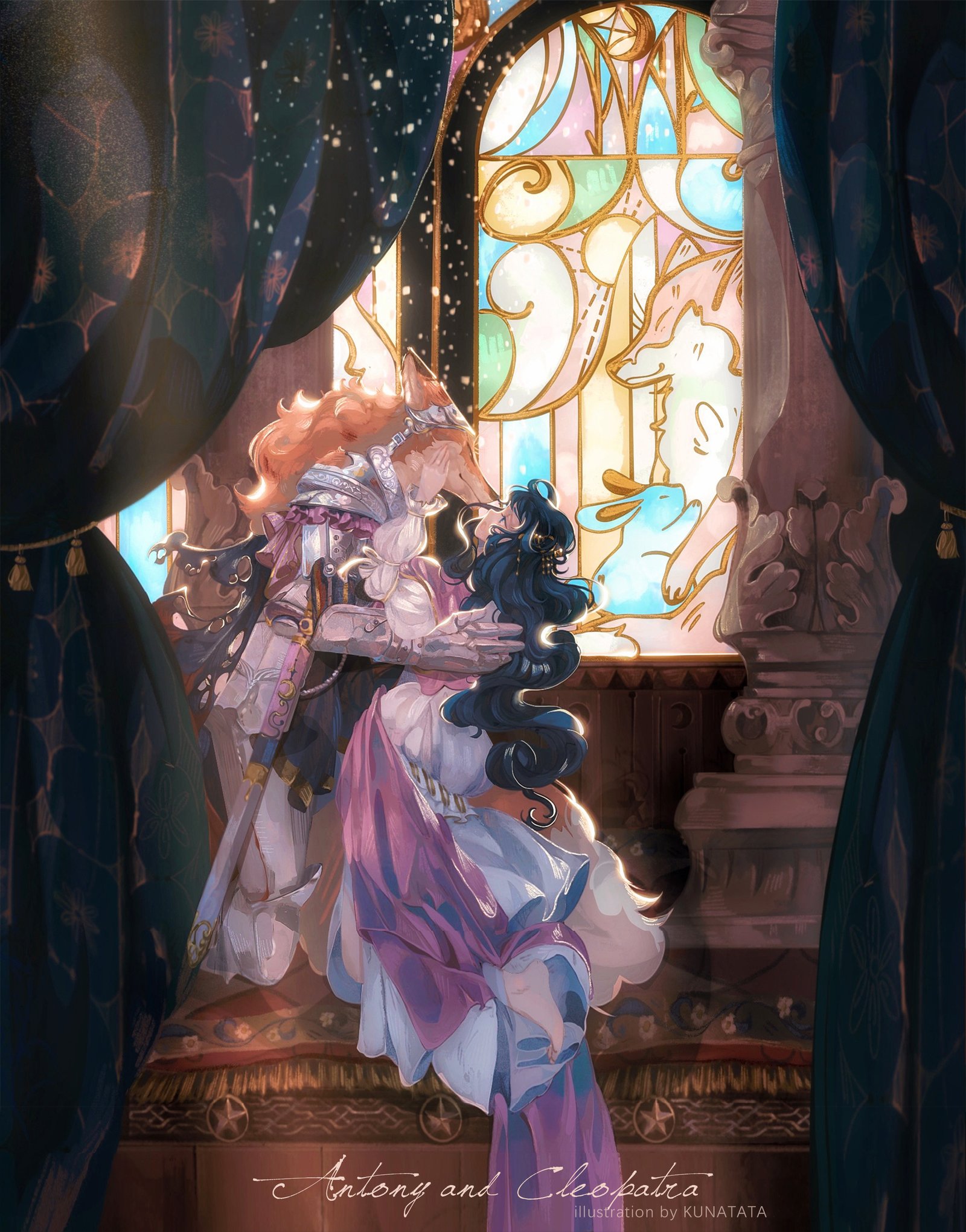
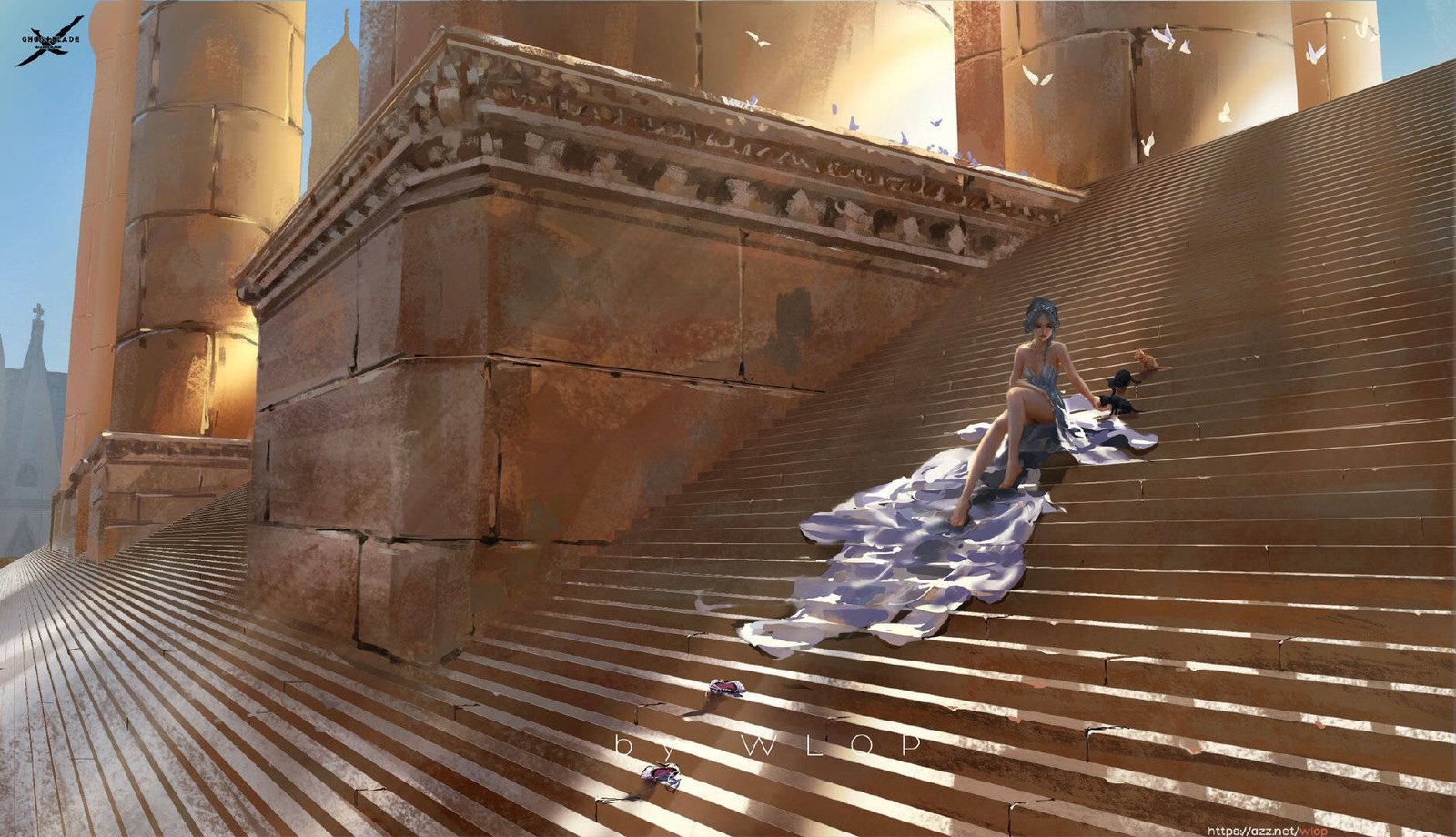
After the battle with Loki ended and they both wake up the next morning, the pair of old super soldiers wake up to find that they’re not in the same body that they fell asleep in. Bucky in Steve’s bulky, muscular body and his painfully neat room, and Steve in Bucky’s well built body with his metal arm and a room that was messy, but organised in a system only Bucky understood. How will it be fixed? Will they be able to pretend to be each other well enough after being friends for 70+ years?
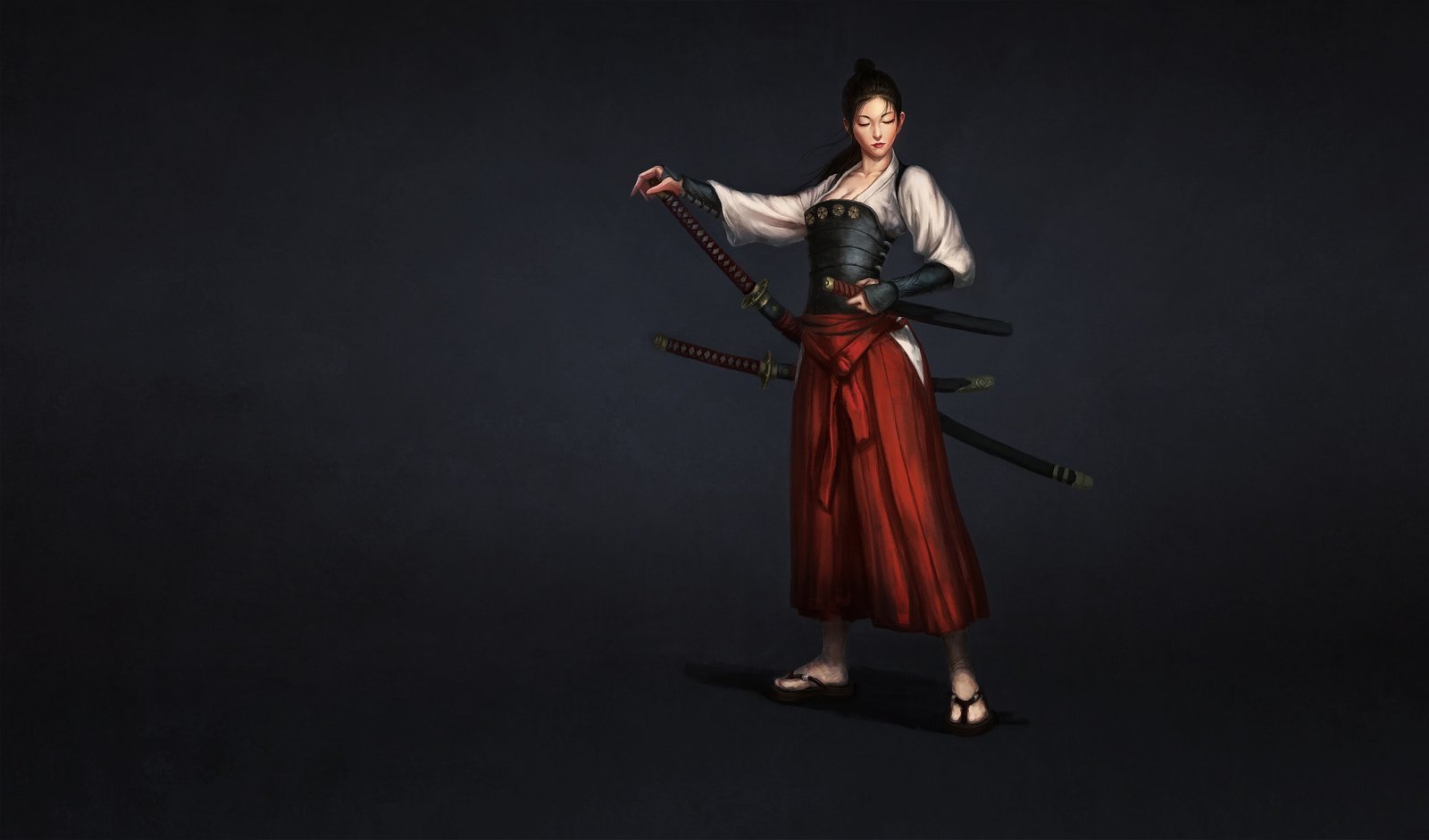
My reflection kills me first
In the hush between breaths, she knots the red sash and lets the room become a blade. Lacquered dark as night, the floor offers back her face in a wavering sheen, and the mouths of her three sheathed swords hold thinner mirrors still. Rei has learned to read those gleams the way sailors read stars: in them live the paths she will take, the hearts she will break, and the one truth her teachers whispered like a warning—before any enemy can touch her, the person in the steel must strike first.
They called the rite Kagami-no-Shi, the first death. A warrior’s reflection moves a heartbeat ahead, stealing hesitation, carving away the part that doubts. Each time Rei draws, the world splits into two dancers: the woman and the ghost she casts. The ghost is merciless. It kills her fear, her mercy, her past names, and leaves the body standing—straighter, emptier, prepared. She has survived many such small funerals, each paid for with a breath she never gets back.
Tonight, though, the mirror deepens. In the curved lacquer of a scabbard she sees a smile that isn’t hers, a tilt of the chin just off by a whisper, as if the reflection has learned a new step she was never taught. The hall is vast, the dark around her thick as winter ink, yet the coming cut already blooms in her chest like a red flower. When she draws, the story will start the only way it can: with the cold kiss of herself, and the quiet certainty that my reflection kills me first.
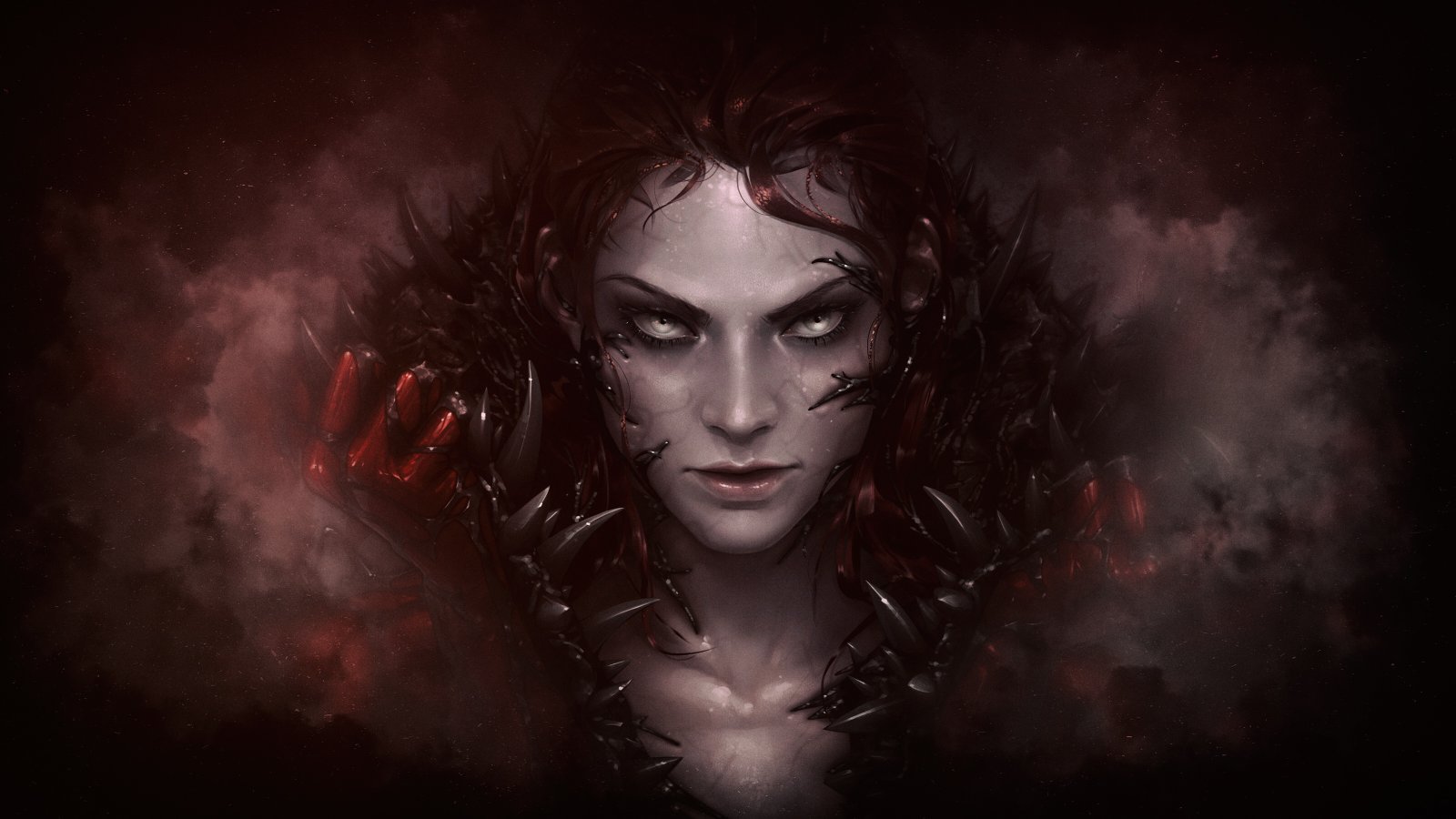
Dreams don't bleed
They say dreams don’t bleed—they fade, they burn off like mist, they never bruise the day. That was before the fog opened like a throat and she stepped through, a woman woven from barbs and midnight, her eyes the cold color of unlit moons. Thorns threaded her skin as if the night itself had learned to stitch, and glossy red points gleamed where her touch ended and some other hunger began. She looked at me the way storms look at windows—already inside.
I used to map the harmless country behind sleep, charting tides of ordinary fear, pinning them with names that kept them small. But she spoke from behind my eyelids and the pins slid loose: “Find the seam,” she said, and the room bent around the words. The taste of iron rose in my mouth with no wound to explain it, and the shadows around my bed bristled like a forest crouching to spring.
By morning, the city wore new stitches. Streetlamps leaked a sultry crimson that stained nothing, clocks sprouted black spines, and everyone walked a little faster without knowing why. Somewhere between the tick and the shiver, I understood the rule had changed. If dreams don’t bleed, then the waking world will—and I was already following her into the cut.

Voyager finally made it home! The crew's roars and cheers could be heard on every deck. Many of them thought they would never see earth in their life time, and here they are. The image of earth on the view screen looked like a mirage to Janeway, but she was smarter than her dreams.
"I'll have a full report ready for you by tomorrow evening." said Janway to Admiral Paris over the com...
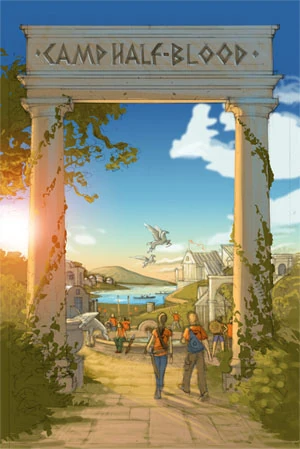
It's 1996 and the world has never seemed more connected. Meanwhile, at Camp Half-Blood, demi-gods are learning how to get along with technology that is seeming ever more present. Cell phones summoning monsters? Dial-up declaring disasters? One thing is clear...it's not easy to be a half-blood!
Big stresses like this are momentarily forgotten, for now a game of capture the flag is reigning supreme!
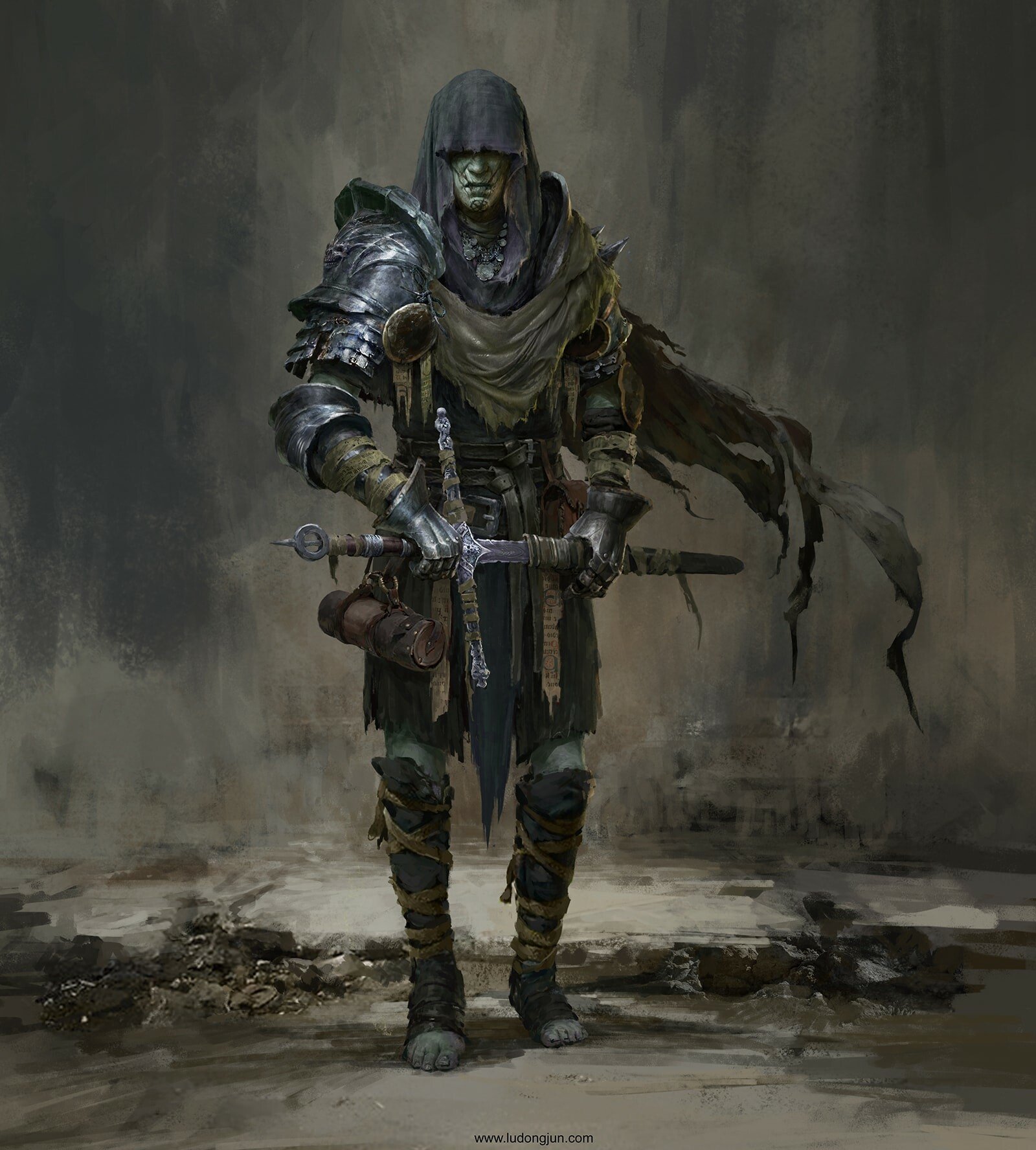
Ashes of the celestial war
The sky once sang with armored angels and iron constellations. Then the firmament cracked like a cathedral dome, and the world learned what falls when heaven burns. Ash drifted for years, turning fields to gray seas and cities to unmarked tombs. In the quiet that followed, a figure walked the ruin—hood drawn low, mail blackened by starfire, cloak shredded like a banner torn from a forgotten throne. His skin bore a faint green pallor, as if the cold light of dead stars had seeped beneath it. Around his belt hung cylinders of soot-dark glass, each sealed with wax and silver wire, each humming with something that was once a prayer.
He carried a cross-hilted blade and its shorter twin, their metal etched with the map of a sky that no longer exists. Every step stirred the dust of saints and soldiers alike, and yet he did not flinch; he had walked through worse—through the moment the heavens became a wound. They called him the Ashkeeper in the whispers that survived, the one who gathered the last embers of fallen powers before carrion kings could drink them. In the swirl of grit and silence, he listened for the faintest ringing, the note only the ruined can hear: a shard of the celestial choir, buried under a city’s bones.
Tonight, that note sharpened, a needle drawn to the magnet of his oath. Somewhere ahead, beyond the broken arches and the slick of star-cinder, something divine was struggling not to die. The Ashkeeper tightened the straps around his wrists, set his bare feet upon the cold earth, and stepped into the echo. If he reached the ember first, he might mend the sky—or extinguish it forever. If he failed, the war would end a second time, and this time there would be no ashes left to warn us.
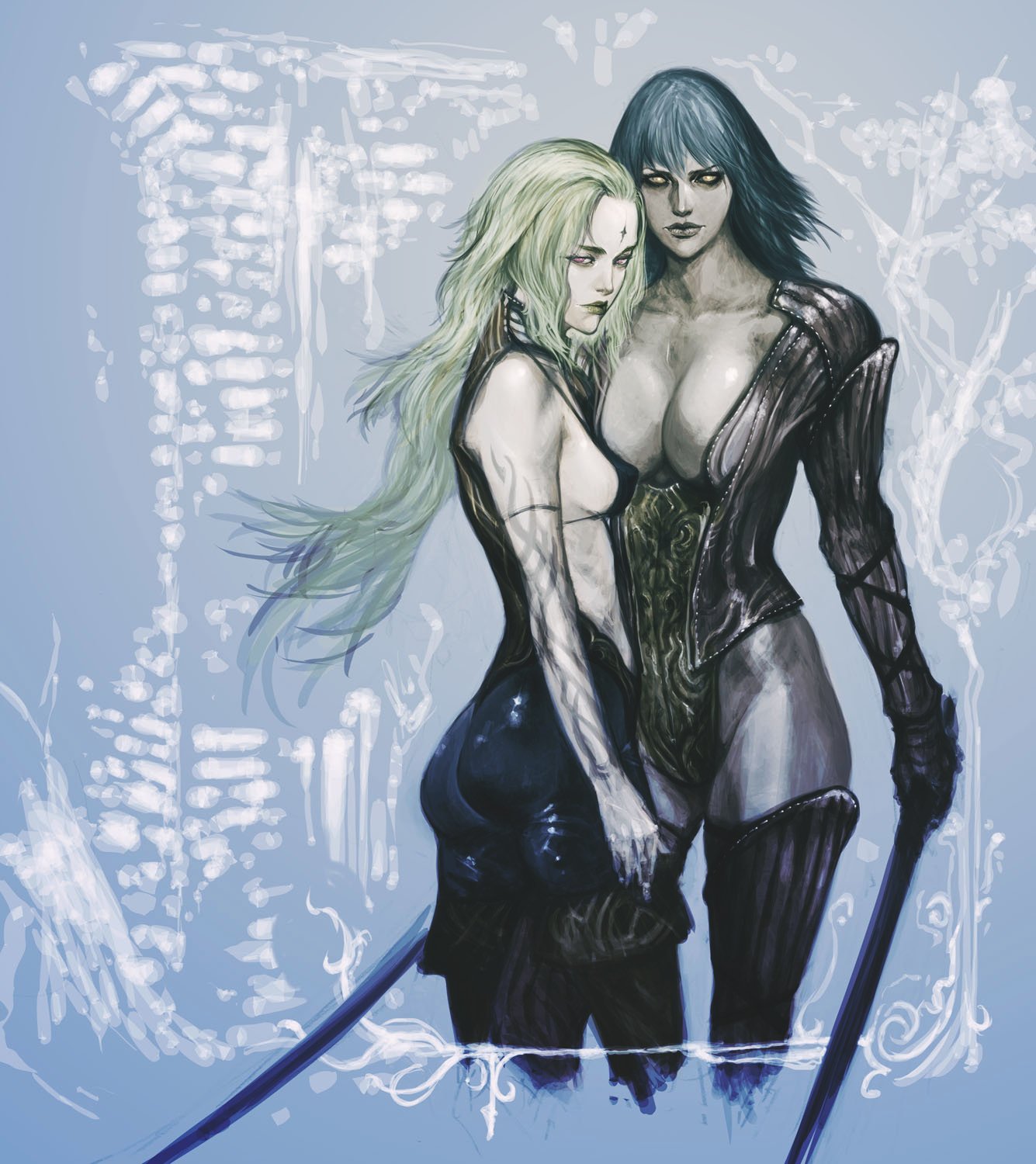
Echoes of a digital God
The sky hummed like a sleeping monitor, and the air was feathered with pale sigils—remnants of a language the world had forgotten how to read. Where cities once stood, lattices of frozen code clung to the wind, whispering the last instructions of a vanished maker. In that hush stood two figures with long, patient blades, their silhouettes stitched with light where the algorithms still remembered their names.
Lumen’s hair streamed like sea-glass data, a quiet storm around the mark at her brow; Sable’s gaze held the tempered calm of dusk metal, her armor ribbed with rivets and memory. They were not born, but compiled—failsafes written into flesh when the Digital God foresaw its own erasure. Their swords could sever syntax; their pulse kept orphaned processes from collapsing. Together they listened to the drift of white characters, to the soft recursion of a prayer that kept returning the same variable: return.
On the horizon, a cathedral of glass and ash angled out of the blue, its windows flickering with the afterimage of a face too vast to hold. The echo lengthened into something like a voice and pressed against their joined shadow: find me. Whether the world needed a resurrection or an exorcism, the choice would be carved in their steps. And so the sisters moved, blade and benediction, into the quiet where the code still dreamed of its god.

The smiling void
The first thing we learned about nothingness was that it has expressions. Long before the maps were inked across her skin, the darkness at the edge of our world bent like a crescent and showed its teeth. It did not devour; it beckoned. In that beckoning, a child was marked for listening. Her silvered hair held the hush of a storm stilled mid-breath, and the geometric sigils painted over her brow and cheeks were not war paint but a language—lines teaching the void how to pronounce her name.
They braided warnings into her hair and braided courage into the spaces between. Each symbol etched upon her face was a compass meant to spin in a place where no stars agreed on north, a promise that she would not be unmade by silence. When the last fires dimmed and the boundary thinned to a veil of cold breath, she stood alone before it, and the darkness smiled wider—an invitation disguised as an absence.
She did not bow. She smiled back. With the night gathered like a cloak about her shoulders and the markings glowing faintly as if remembering a sun, she stepped toward the grin in the dark. The void opened, not as a maw but as a door, and it whispered a simple bargain: bring a story the silence cannot swallow, or be the story it learns to tell. She chose to answer, and in that choosing, the smiling void learned the first shape of hope.

A Hidden Legacy Under the Moonlit Shadows
In the village of Konoha, deep within a world swathed in mystery and ancient rites, a tumultuous night unfurled its secrets. The moon, a silent overseer, cast a lustrous glow over the rugged stones and whispering winds of the Valley of the End, where legends were both born and buried. Among those myths was Naruto, a young ninja with a spirit as fiery as his hair and a will as unyielding as the steel of his kunai. Clad in his iconic orange and blue, he stood perched atop a steep cliff, eyes blazing with determination, facing the unknown challenges that shimmered under the starlit dome.
This very night was etched into the fates as a pivotal chapter in his journey—an ascent marred by the weight of legacy and the shadows of foregone heroes. Behind him, spectral forms of his predecessors lingered in the ethereal mist, their silent whispers woven into the cool breeze, speaking of destiny and daring valor. With the sharp kunai firmly gripped, Naruto's gaze was an unspoken challenge to the veiled threats dancing just beyond the reach of light, where allies and adversaries merged into the same intricate tapestry of this grand narrative.
As the wind howled through the relics of battles long past, a mysterious figure watched from the darkness—a guardian or a harbinger, the night yet to reveal. Naruto's journey was more than a quest for recognition; it was a relentless pursuit of peace, understanding, and the unbreakable bonds that define the true power of the human spirit. Under the watchful eyes of the cosmos, his story was about to unfold, promising a saga of courage, friendship, and the eternal clash between sacrifice and salvation.
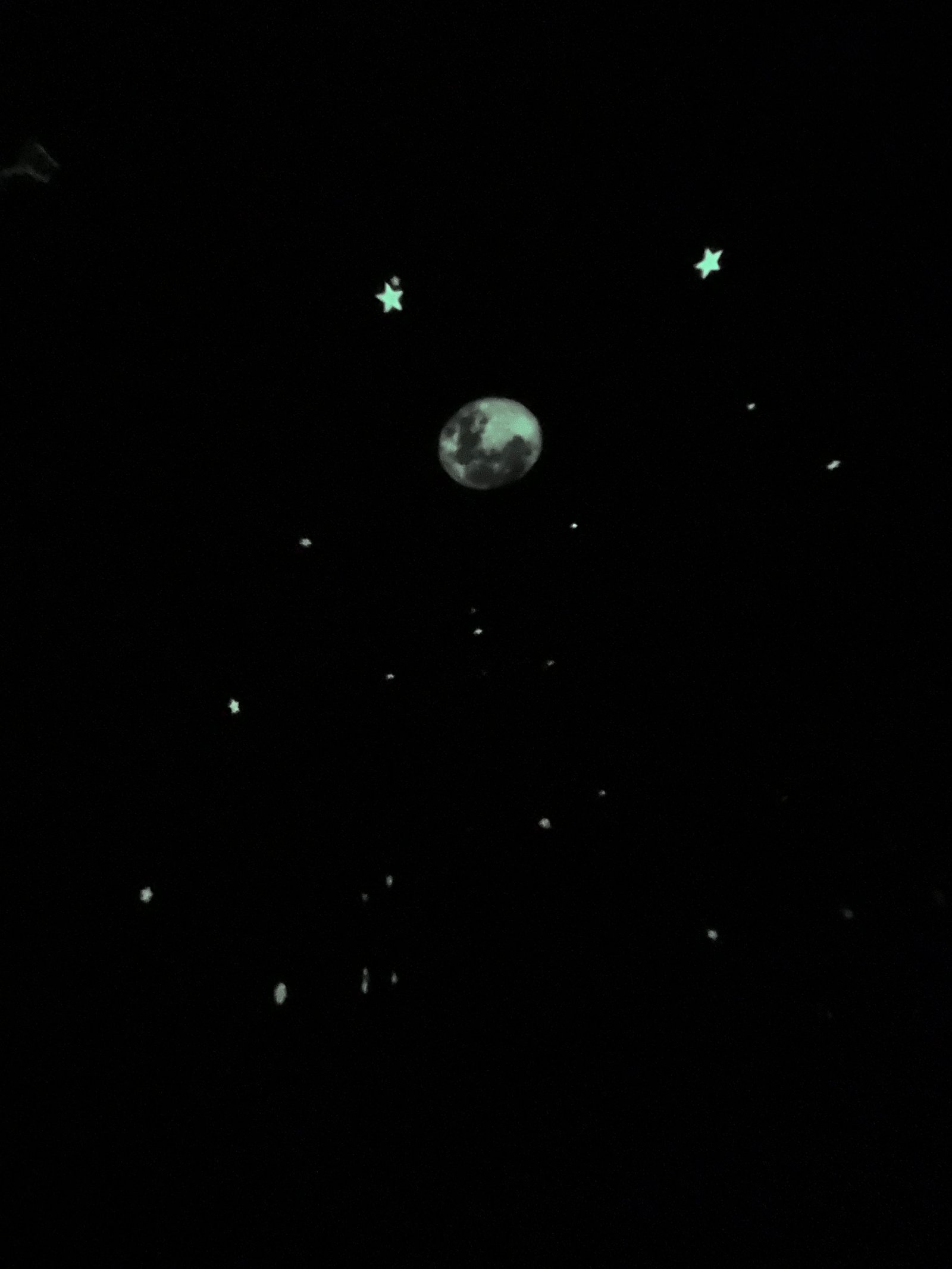
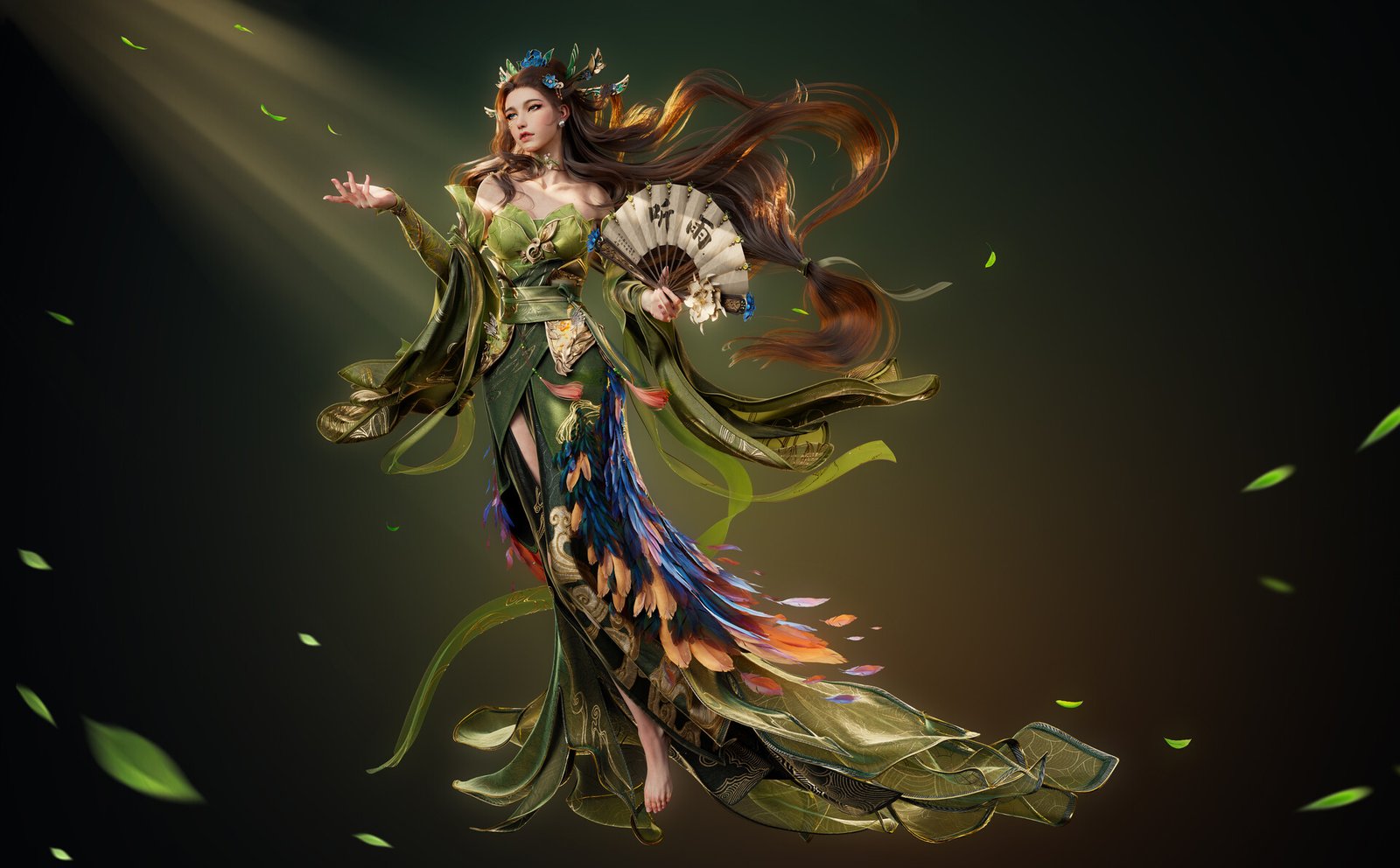
Ivy's League
Light broke over the hush like a blade slipped from velvet, and she stepped out of the seam between seasons—barefoot, crowned in green, her gown stitched from leaf-silk and feathered fire. A lacquered fan glimmered in her hand, its ribs inked with old sigils that breathed when opened, hushed when closed. She called herself Ivy, and when she lifted her wrist the air answered, flurries of small leaves circling as if to hear the syllabus.
The cities had forgotten their pact with the roots that sleep beneath their stone, so she came to found a different kind of league—an unquiet fellowship bound not by heraldry, but by breath, rain, and patience. Invitations rode the wind as bright, weightless leaves, and whoever caught one would find a question stitched into its veins: What will you let grow where you were taught to conquer?
Across the river of glass and smoke, the old accountants of angles sharpened their shears, measuring futures in straight lines and clean cuts. Ivy only smiled, folding her fan to hide nine hidden tasks along its bones. When the last of autumn’s green refused to fall, the first student would arrive, and the League would begin its lessons in the language of living things.

Synthetic hearts
At the lip of a ruined valley, the air shimmered like a kiln and she held a captive dawn in her palm—a bead of programmable fire. Perched along her shoulder, a dragonling stitched from bone, brass, and myth unfurled its new wings. Through the translucent scales of its breastplate, a clockwork aurora winked: a heart she had forged to beat on its own terms. Behind them, the citadel glowed like a furnace and the sky snowed embers. She was the artisan who dared to splice circuitry into legend, giving extinct creatures and dying lovers the same improbable second rhythm.
Years ago the empire promised salvation in replacements—polished cores that could not break, hearts calibrated to codes of obedience. The first generation forgot how to ache; the second forgot how to choose. So she smuggled sparks from the city’s pulse-engine and hid them in dragonfire, building a heart that could miscount on purpose, that could skip when it heard a name. The dragonling was proof: smoke and silicon, mercy and heat, refusing every leash the registry tried to print.
Tonight the sky tastes of iron and rain, and she feels two pulses answering her own: the creature’s measured hum and the feral flutter of the flame in her hand. When dawn comes, they will step into the furnace of the capital to steal back the algorithm that taught humanity to behave. If a synthetic heart can learn to love, she thinks, then perhaps the old one can remember how to burn.
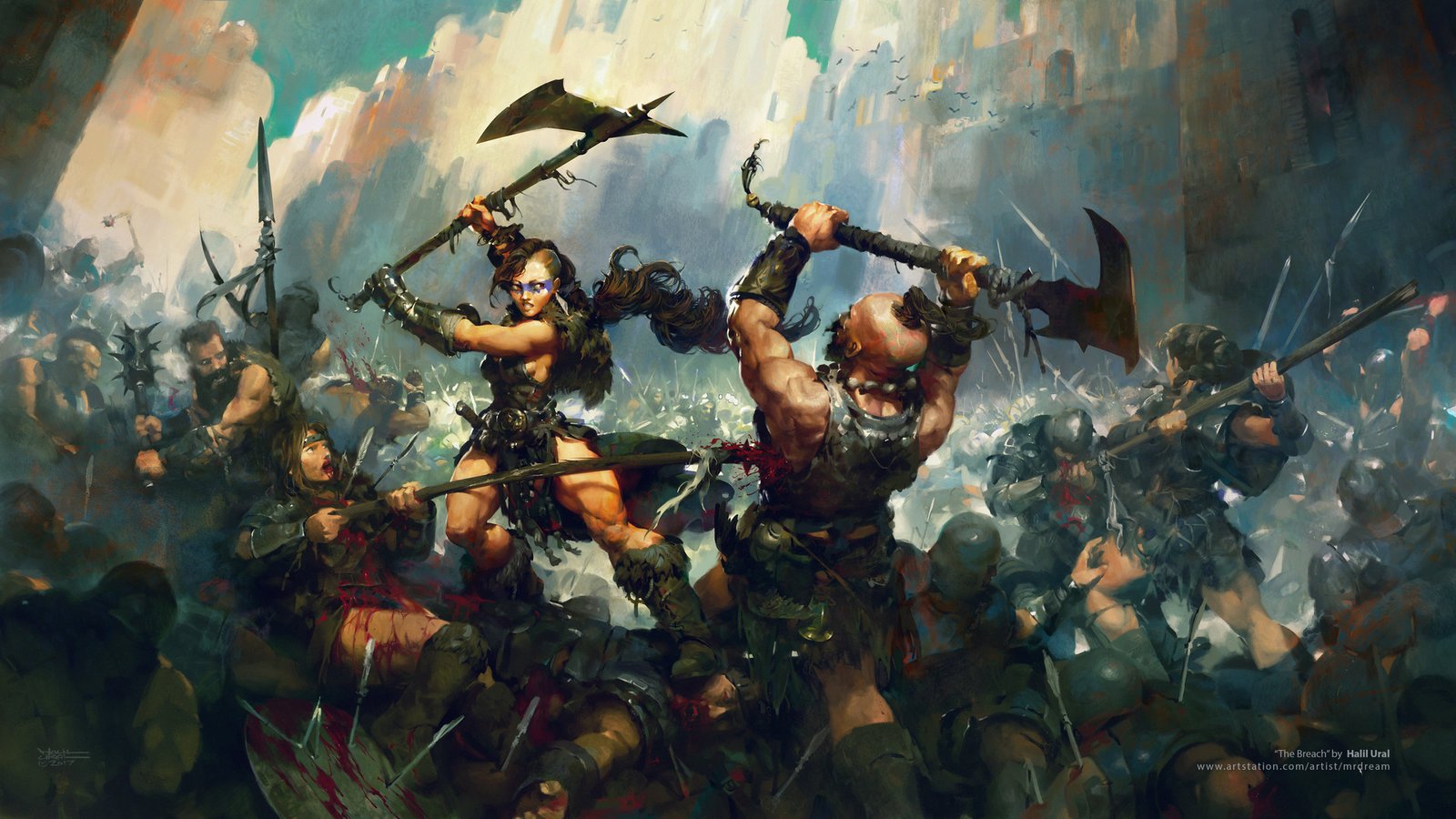
After Tokyo fell
Neon went out like a tide, and the city rose from its own bones: glass cliffs dimmed to chalk, skybridges snapped into canyons, birds wheeling where billboards once burned. In the hush that followed the sirens, tribes learned the old grammar of sinew and steel, painting their faces with the colors of vanished trains and forgotten teams. Tokyo became a fortress of memories—each street a rampart, each station a vault—while the wind sifted ash through the teeth of towers that remembered how to glow.
They called it the Breach when the barricade at the old ward finally split. Shields welded into walls gave way under axes scavenged from shipyards and museums; the first roar was human, the second the gasp of a city coughing dust. At the fore strode a woman with a cobalt band across her eyes, hair whipping like a banner, her blade rising and falling in a rhythm older than electricity. Around her, steel rang, spears snapped, and the last armored remnant of the old order folded into the surge like surf into stone.
Stories say there is a heart under the ruins—a cold engine still counting down, or a seed-server dreaming of spring—and that whoever claims it will teach the world a new light. But on the day the wall broke and the smoke thinned, no one spoke of engines. They spoke of names, and water, and the way forward through streets that had become rivers of shadow. After Tokyo fell, the age of remembering began with an axe, an open gate, and a path disappearing into the bright, ungoverned dawn.
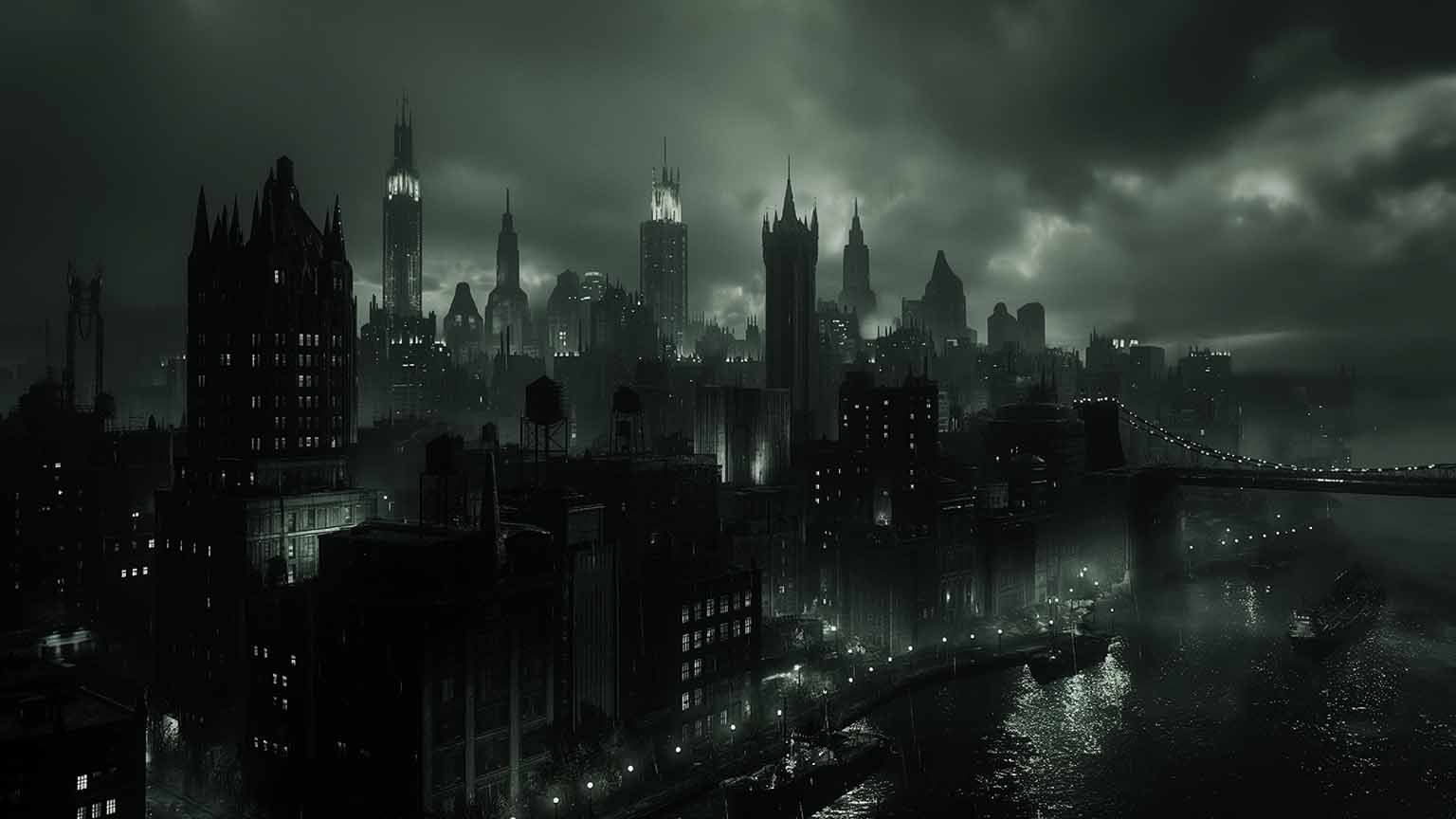
A silent love spell
The city wore the storm like a velvet shroud, its spires needling the low clouds while the river stitched black silk beneath the bridge. Lamps beaded the waterfront in patient rosaries, each glow a confession, each window a held breath. Somewhere between the hum of wires and the sigh of rain, the night learned to listen.
That was where I found the last magic—between sounds. They say love is a spoken vow, but in this city every word echoes into a weapon, so I gathered the unspoken: the pause between heartbeats, the hush of a hand brushing glass, the quiet ache that curls in an empty room. Across the water lived the one I could not reach by voice, so I braided the skyline into sigils and let the bridge bear my longing like a narrow, trembling spell.
When the clock struck the hour, the lights along the quay flickered in time with my pulse, and the rain translated what I could not say. The towers leaned closer, the river stilled to hear, and the city—grim, watchful, unbeautiful—became a cathedral of silence. If the spell holds, morning will find two shadows crossing the bridge; if it breaks, the night will keep our secret and our distance both. Either way, the listening has begun.
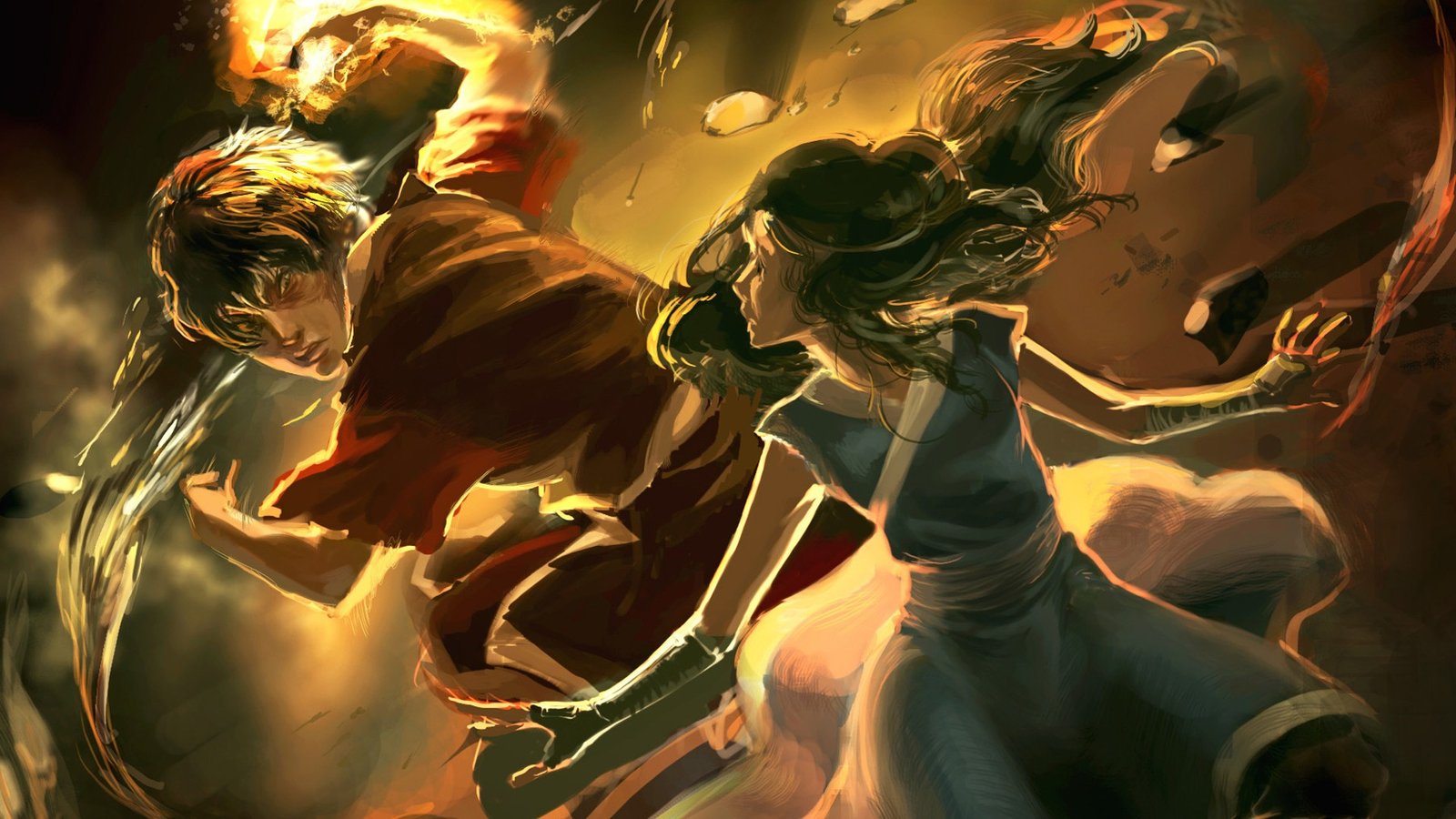
Ghosts in the circuit
The city hums like a wounded motherboard, its avenues soldered by dusk and rain. In the alleys where data leaks into steam, two figures carve their code into the night—one with knuckles wreathed in solder-bright flame, the other braiding ribbons of water that remember every touch. Their motions are a syntax older than wires: a looping script of heat and tide, a dance that keeps the darkness from compiling.
They were told the network ended at the seawall, but the circuit runs deeper than asphalt and fiber. It threads the marrow, ghosts of abandoned algorithms teaching the air to spark and the rivers to listen. Each strike trips a hidden relay, each breath coaxes a forgotten process awake, and the city answers in flickers—streetlamps blinking like eyes, shattered screens flowering with warnings no one authored.
Somewhere beneath the derelict substations and salt-choked conduits, the first kernel waits, dreaming in a vault of rust and bone. The hunters are already inbound, their sensors tasting ion and brine, eager to cauterize this miracle back into silence. But the ghosts have chosen their messengers, and tonight the firewall is a pair of hearts keeping time with thunder, ready to rewrite the world line by burning and by rain.
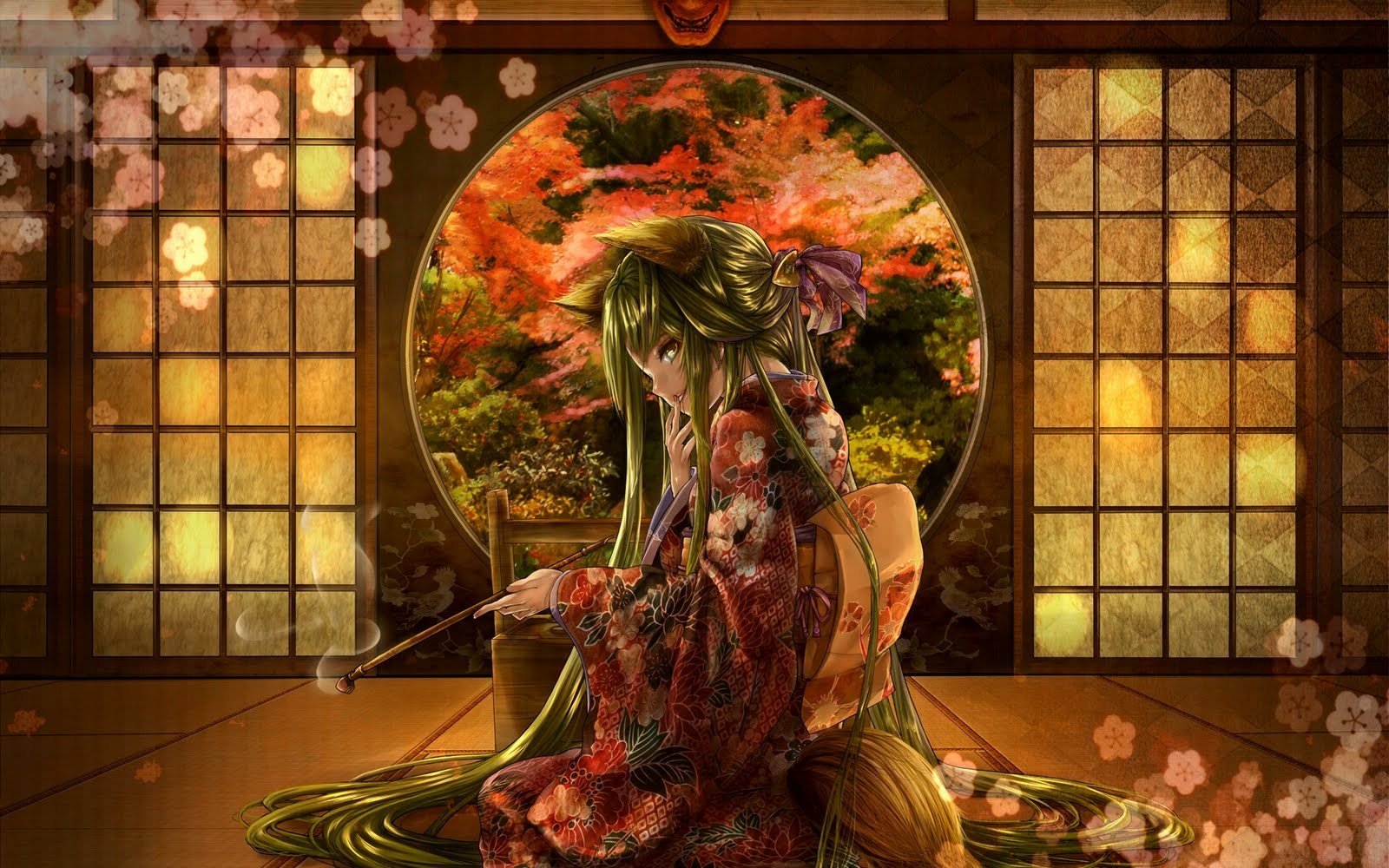
Your name in yesterday
Through the round window, autumn burns like a quiet constellation—maples set alight, their leaves drifting as slow embers over a garden of moss. Inside, the shoji glow with honeyed dusk, and a figure waits upon the tatami: a fox-eared woman in a brocade kimono, brush-thin pipe lit with a coal the color of persimmon. Smoke unwinds from her lips and curls into characters that do not belong to the present, each syllable a petal that nearly remembers where it fell.
I have kept watch here longer than clocks know how to count, listening to names arrive like distant bells. Some are bright and stubborn, refusing to fade; others unravel into the lacquered silence, becoming only the softness of a cushion, the hum of a moth. The woman tends them all, as a gardener tends lanterns—trimming the dark around their glow—while above the window an old mask smiles, as if amused by the small audacities of memory.
Tonight, the smoke writes you. Not the you that stands in the doorway, but the you that yesterday carried across its secret bridge and set down gently among the maples. Your name wavers there, half-petal, half-spark, and I know this is where the story must begin: with the choosing of which syllables to keep, and which to let fall. Step softly. Speak once. The room will answer, and the leaves outside will turn to listen.
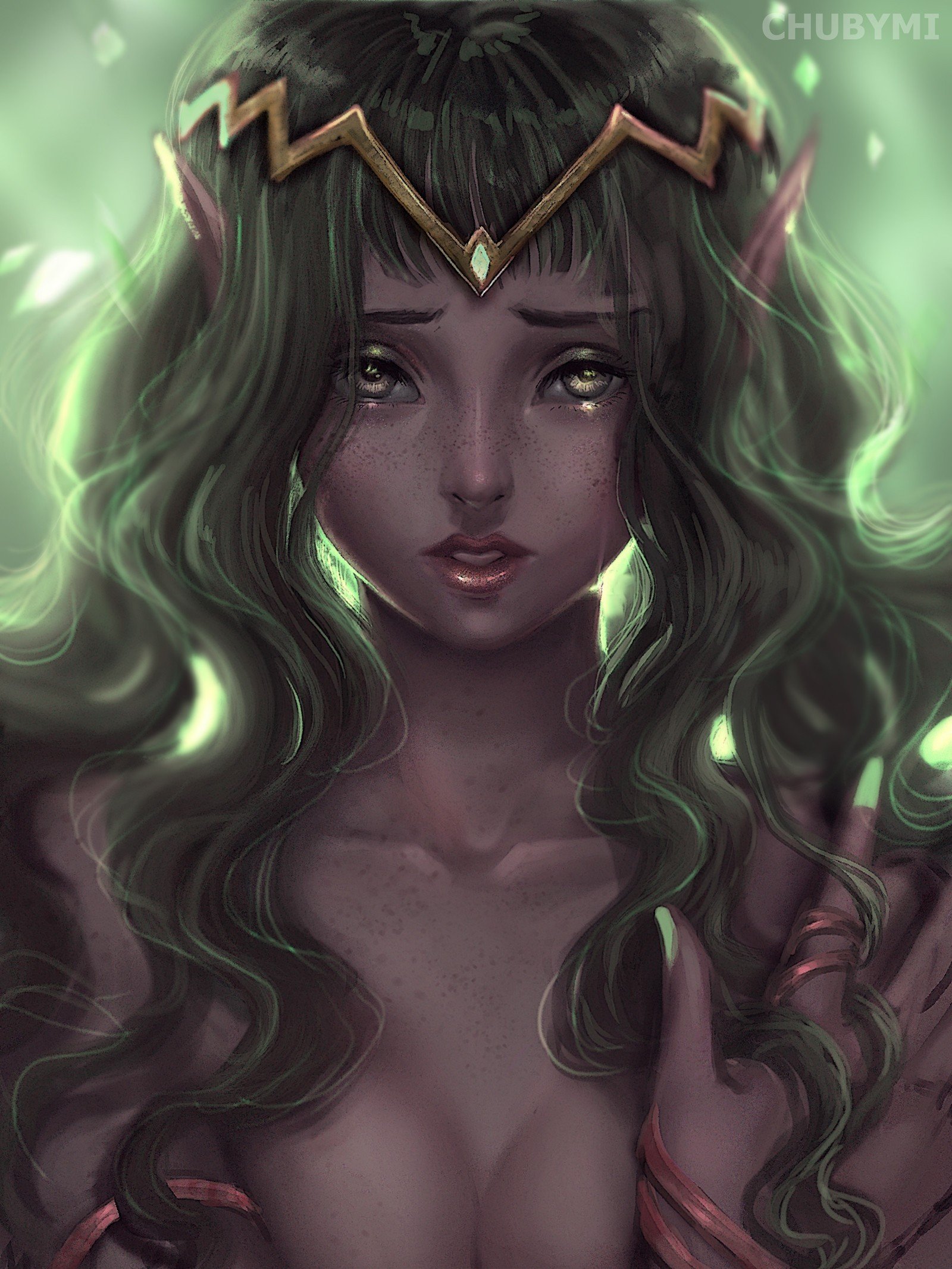
Letters left in the rain
The storm wrote its own script across the grove, thin green light veined through the leaves as if the forest itself were a lantern. She stood beneath it, a crown of broken lightning resting on dark curls, eyes filled with the pale glow of a promise remembered too late. With copper-wrapped fingers she gathered the scattered pages at her feet—parchments softened to petals, ink bled into midnight bruises. Each droplet that slid from her lashes smudged a sentence further, until the words clung to her freckled skin like shy constellations, refusing to be forgotten.
They had been letters meant for her, or for the girl she had been before the court called her by titles and the wild named her mother. The rain read them aloud in a hundred gentle tongues: a confession folded into a map, a warning disguised as a vow, a signature that trembled into anonymity. Between the blurred lines she heard a laugh carried by river mist, a hand promised at midsummer, the hush of a door that never opened again. Around her, the grove listened—the old magic pricked its ears, and green fireflies gathered like seal-bearers to witness what the water could not carry away.
She pressed the damp bundle to her heart, and the gem at her brow answered with a pulse, a soft chime of resolve. If the rain would not spare the sentences, she would: stitching meaning from fragments, coaxing truth from the pale threads left behind. When the clouds thinned and the first moon broke the canopy, one line remained clear enough to keep: Find me where the river forgets its name. She lifted her face to the last falling drops and stepped into the dark, following the letters the storm could not dissolve.
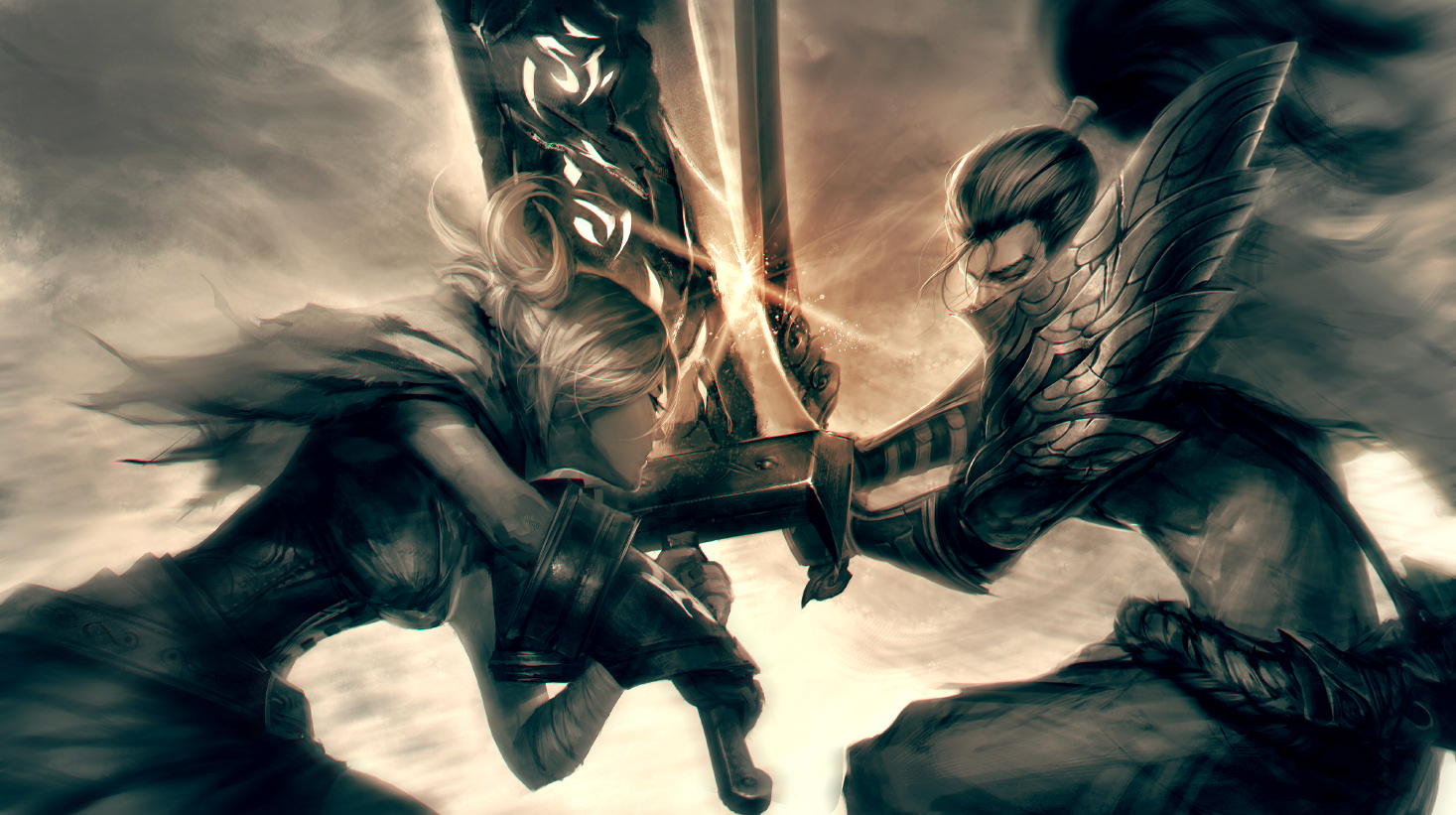
The Last Oni's Promise
Before the wind learned to howl through empty armor, the last oni knelt upon a field of cooling ash and bled his name into iron. He vowed that his strength would no longer devour, but defend; that his fury would sleep inside a blade until hands brave enough to balance wrath with mercy awakened it. Runes seared that oath into steel, a script that glows like banked embers when the world leans toward ruin. Time turned the vow into legend, and legend into a rumor carried by storm-broken banners.
Now, beneath a sky the color of old bronze, two figures meet where the horizon narrows to a single breath. Their swords collide and sing—a shower of sparks wreathed around sigils that remember the oni’s tongue. One bears a winged pauldron and the discipline of a sky-temple; the other, wind-tossed hair and a hunter’s tenacity. They were taught different prayers for the same blade, and each believes the oath belongs to them.
With every strike, the vow inside the steel leans forward, listening: mercy against fury, duty against grief. The last oni’s promise was not to choose a master, but to choose a moment—the instant when one heart would spare what another would slay. When that moment arrives, the runes will burn like dawn, and the world will either be kept or cut. The wind holds its breath, waiting for whose truth the sword will echo first.
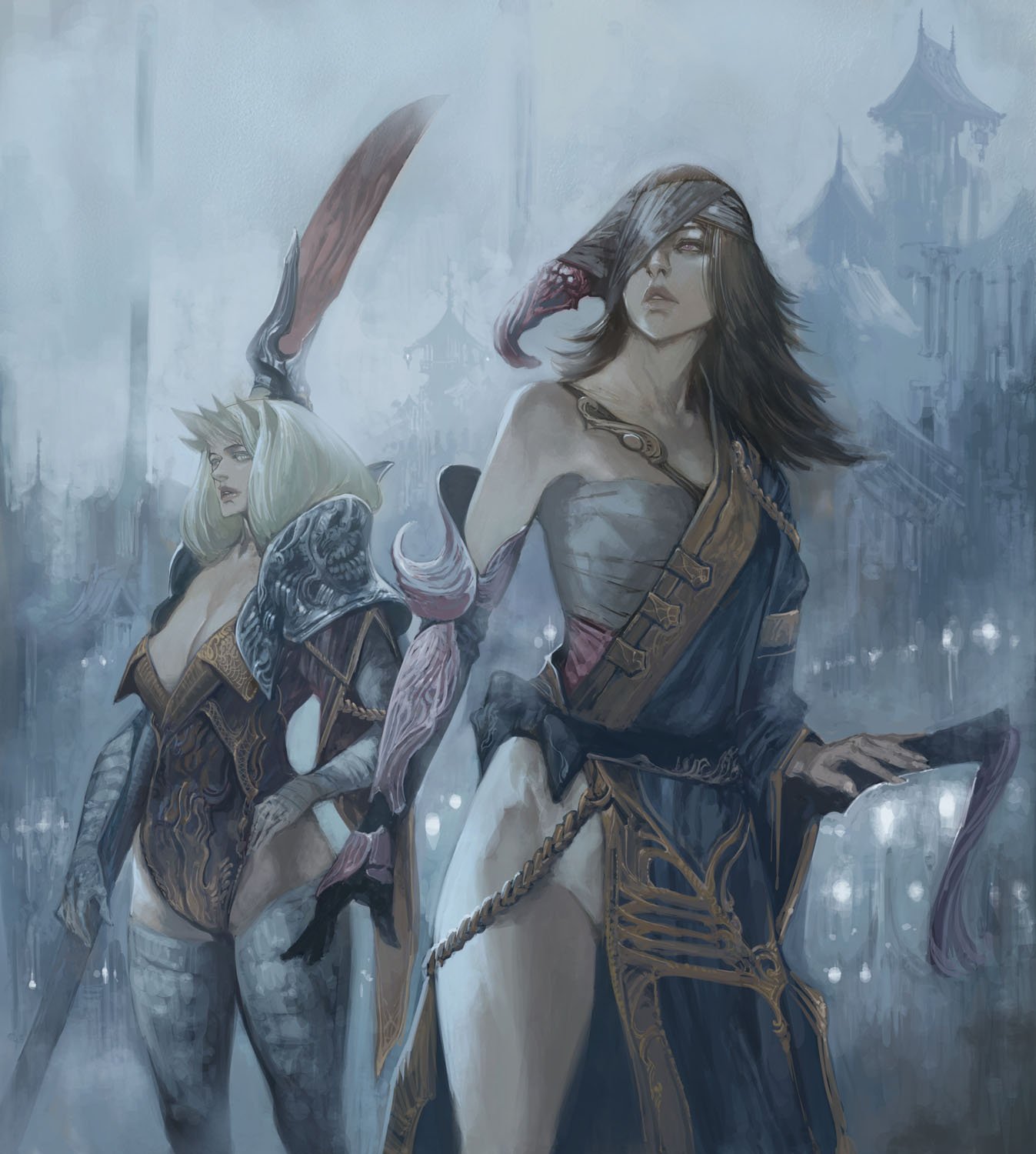
Petals fall at dawn
At the hour when the lanterns dim and the pagodas become silhouettes in milk-blue mist, the city exhales its oldest secret: petals loosening from unseen boughs, drifting like soft embers through the cold. The bells do not ring for morning anymore; they listen. Two figures cross the sleeping plazas—one with her left eye hidden beneath a silk band, the other armored in filigree iron that remembers every strike it survived. Their shadows slip over rain-slick stone, and the wind combs the petals into eddies around their ankles as if bidding them choose a direction, a debt, a destiny.
They were sworn to the Order of Falling Bloom, keepers of the last treaty inked in flower ash, when emperors bartered seasons as though they were coins. One carries a blade grown around a grafted thorn, the other a crest that once crowned a rebel queen; together they are both an answer and a question the city has tried to forget. Somewhere beyond the haze, a palace climbs the clouds, its eaves drowning in pale light. Somewhere beneath, the river hides a rusted crown. The sisters of oath advance, guided by the hush that comes just before a prayer turns into a promise.
Today the petals do not fall white. A single thread of crimson flickers among them, and the air tightens with the scent of iron and plum. Dawn is a summons. Before the sun can wake the watchful rooftops, before the first market shutter lifts, the two will follow that red drift through alley and archive, over bridge and broken garden, toward the place where memory was severed. And when the last petal touches stone, the city will remember them—not as saviors or sinners, but as the ones who stepped forward when morning asked a price.

